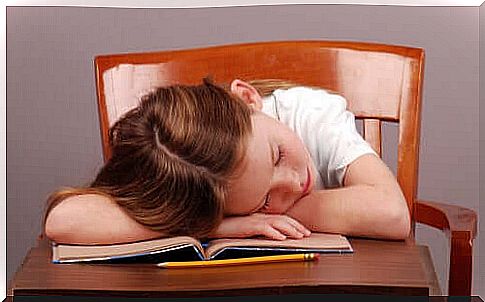Children Who Go To Bed Late Suffer More Inconvenience

The relationship between lack of sleep and different health disorders is evident. Furthermore, in the case of children, bad habits of rest can be created. Read on to find out why children who go to bed late suffer more inconvenience.
The rest routine is essential, as it is a fact that children who go to bed late suffer more inconvenience. They acquire, from the beginning, bad sleep habits that influence their health.
We are all affected by not sleeping, but each stage of life requires a different time to recover energy. It is certainly not the same for a newborn and an adult.
Rest hours according to age
The difference in rest hours according to age is important. As we grow, we go from sleeping between 14 and 17 hours to needing only 7-8 hours in adulthood. Meanwhile, school-age children need an average of 10 to 12 hours of sleep.
It is natural that there are certain times when these needs are changed in a timely manner. But the important thing is to respect sleep habits and sleep as much as possible.
According to age, the estimated hours of rest are:
- Newborn babies up to 12 months of age: between 11 and 14 hours a day is recommended.
- Children up to 5 years old : between 10 and 13 hours a day.
- Up to 13 years old : between 9 and 11 hours a day.
- Young people up to 17 years old : between 8 and 10 hours a day.

Why do children who go to bed late suffer more inconvenience?
Many disorders stem from lack of sleep or poor rest habits. When we allow the little ones to go to bed late, we can encourage disturbances of the following types:
- Insomnia. By not being educated about rest hygiene, children end up not internalizing the sleep patterns that favor rest. Thus, sleeping late can favor a lighter sleep, waking up frequently and, ultimately, not resting.
- Infant fatigue. Not respecting the hours of sleep makes the child more tired. Wake-up times can be the same every day, because of school, or vary on days when there is no school. In both cases, the children are unable to maintain stable daily and nightly routines, as they did not have the necessary rest time.
- Apathy. Children with this disorder are in a state similar to depression. They don’t feel like doing anything or are interested in anything. Their emotional state remains at a constant low energy, which causes them to be more isolated.
- Anxiety. The continual lack of rest causes mood swings and anxiety problems in children. The thoughts that produce anxiety in the child are sustained or aggravated by lack of rest.
Bedtime Tips
Whenever it is within normal standards, the child will be able to sleep later at some point. It is not about keeping the rules in place without exceptions, but about being flexible as far as possible.

Your child must recognize when they are faced with an exception and when they must adhere to the daily schedule. As tips that can help guide you in learning to rest, we can list:
- Stability in schedules. Sleeping and getting up at certain times. You and your child can create a schedule that you will always have in sight. In it, you’ll write down your bedtime and waking times on school days and holidays to make sure you’re going to develop on a day-to-day basis.
- Relaxing environment. The fourth must be a temple of rest. Try to avoid distracting factors such as television or video games. Your child needs to find a space specially designed to rest in their bedroom.
- Preparing him for sleep. Before bedtime, your child should be in a relaxing situation. You should avoid getting too active with action or horror movies or playing video games. For this, reading or listening to soft music helps.
- Talk to him about everyday life. Any thoughts that worry him will stay with him at bedtime as well. Therefore, it is recommended that you talk to him about everything that concerns him, ensuring that he can lie down in a relaxed state.
- Watch your food. It’s important to pay attention to the foods your child eats. Some are stimulating, preventing a restful night’s sleep.
In conclusion, you should pay as much attention to your child’s rest routine as to feeding or studying. In the long run, children who go to bed late inevitably end up suffering the consequences of mood and performance in daily activities.









